|
|
|
Sort Order |
|
|
|
Items / Page
|
|
|
|
|
|
|
| Srl | Item |
| 1 |
ID:
138480
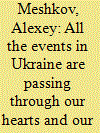

|
|
|
| 2 |
ID:
138493


|
|
|
| 3 |
ID:
138482


|
|
|
|
|
| Summary/Abstract |
The impact of the Ukrainian crisis on the structure of international relations as well as accelerated Russia's turn toward Asia as one of its widely discussed consequences can be hardly overestimated. Reorientation, very much within the concept of the multipolar world, began long before the crisis: Russia was seeking wider cooperation with the APR countries as the future center of world politics and economy; wider investments and high technologies of the most developed countries to whip up the economies of Russia's Asian regions and diversify political and economic cooperation so that to reduce its dependence on the West. Before the clashes in Ukraine, the leading Russian politicians were unanimous in their conviction that closer cooperation with Asia would complement rather than weaken Russia's partner relationships with the U.S. and the EU. Amid the Ukrainian developments the West is cutting down its cooperation with Moscow to force it retreat from its positions; this has woken up the Russian elite to a simple thought that there is no alternative to intensified cooperation with Asia.
|
|
|
|
|
|
|
|
|
|
|
|
|
|
|
|
| 4 |
ID:
138489
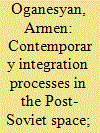

|
|
|
|
|
| Summary/Abstract |
ESTEEMED COLLEAGUES, today we are meeting here in Yalta for the fifth time at an annual conference organized by the International Affairs journal with support from the Russian Foreign Ministry. At our meetings we discuss the concept of "Eurasianism" both as an idea and as the realization of this idea on the practical level. Every year, our discussion brings something new to the understanding and assessment of integration processes in the post-Soviet space regarding a broad spectrum of political, economic and humanitarian ties. Every year, the makeup of our participants renews and expands both numerically and geographically. Every year, we say good-bye only to meet here on the Crimean land again next fall. Today, this conference is especially important for us, as it is taking place in totally new geopolitical conditions. We have gathered again in Yalta, in Crimea, but this time on Russian land. I am looking forward to a lively and productive discussion. I would like to give the floor to Dmitry Alexeevich Polyansky.
|
|
|
|
|
|
|
|
|
|
|
|
|
|
|
|
| 5 |
ID:
138481


|
|
|
|
|
| Summary/Abstract |
AFTER THE ESTABLISHMENT in 1955 of diplomatic relations between the Soviet Union and what was then West Germany, Russia and Germany have accumulated an impressive reserve of confidence and traversed a difficult historic path of conciliation between them. Despite turbulent times, Moscow and Berlin for a long time gravitated towards each other and valued this. Relations between the two countries' leaderships were developing rapidly on the basis of bilateral documents and there were strengthening ties in economy, trade, energy, education, science, arts, and environmental protection. There were increasingly frequent youth exchanges and there were indications that the civil societies of Russia and Germany were drawing closer together in practical terms. Russian and German politicians, public figures, and civil society activists constantly stressed the unique character of Russian-German partnership, which became an important factor of peace and stability in Europe. Diversified cooperation between the two countries became a vivid example of good-neighborly relations between two European nations
|
|
|
|
|
|
|
|
|
|
|
|
|
|
|
|
| 6 |
ID:
138483
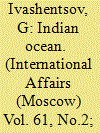

|
|
|
|
|
| Summary/Abstract |
The world's main region of oil and gas extraction; the world's busiest trade route; the only year-round route between Russia's European part and its Far East; the home region of Afghanistan and Iraq, the seats of the largest armed conflicts, and of Iran, the target of Western attacks for over three decades - now the Indian Ocean and its littoral zone is an entanglement of numerous problems. Some of the local states cannot boast domestic stability while pirates have made the coastal waters of the Horn of Africa and the Strait of Malacca very dangerous.
|
|
|
|
|
|
|
|
|
|
|
|
|
|
|
|
| 7 |
ID:
138486


|
|
|
|
|
| Summary/Abstract |
There is a well-known legend of Phrygian King Gordius, who tied a highly complex knot that defied all attempts to untie it. An oracle predicted that the man who would untie it would rule the world; the knot was finally undone by Alexander the Great, who did so by cutting through it with a sword. "Cutting the Gordian knot" is often used as a metaphor for solving an intractable problem by using a non-standard and very efficient method.
|
|
|
|
|
|
|
|
|
|
|
|
|
|
|
|
| 8 |
ID:
138492
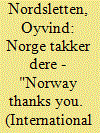

|
|
|
|
|
| Summary/Abstract |
IN THE NORWEGIAN CAPITAL'S largest cemetery, there stands a monument to Soviet soldiers with three words on the pedestal, "Norge takker dere" - "Norway thanks you." These are simple words but they express the deep feelings that the Norwegians had after the Soviet army, in October 1944, drove the invaders not only out of the Soviet Union's own Arctic areas and Kola Peninsula but also out of Eastern Finnmark, a Norwegian province that in those days bordered the Soviet Union and today borders Russia.
|
|
|
|
|
|
|
|
|
|
|
|
|
|
|
|
| 9 |
ID:
138488


|
|
|
|
|
| Summary/Abstract |
The nuclear crisis on the Korean Peninsula is escalating and is increasingly difficult to resolve. The six-nation mechanism for negotiating a solution, which brings together Russia, China, the United States, Japan, North Korea, and South Korea, has remained stalled for more than five years. Agreements enshrined in the sextet's Joint Statement of September 19, 2005 have never been put into practice. Relations between the two Koreas are as sour today as ever, and time and again tensions between Pyongyang and Seoul reach extremely dangerous proportions.
|
|
|
|
|
|
|
|
|
|
|
|
|
|
|
|
| 10 |
ID:
138485


|
|
|
|
|
| Summary/Abstract |
G. Rapota: This is a very good project, which is designed to create a common statehood. However, before approaching the issue of common statehood, it was necessary to resolve a number of very serious problems. It has been recorded in all the principal documents. It was necessary to create a single social field for the citizens of Belarus and Russia. This includes free movement, the freedom to choose the place of employment, residence and studies. In other words, it was creating conditions so that Belarusians in Russia and Russians in Belarus do not feel strangers. Another group of issues concerns economic integration. Our goal is to create a single field for Russian and Belarusian business, for the industrial, financial and banking systems. There are also foreign policy goals - specifically, to harmonize our foreign policy efforts on the international arena. There are military-political and scientific and technical goals. Only after they were achieved, there will be grounds to speak about the formation of the Union State, the passage of a constitutional act, the introduction of a single currency and so on and so forth.
|
|
|
|
|
|
|
|
|
|
|
|
|
|
|
|
| 11 |
ID:
138494
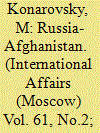

|
|
|
|
|
| Summary/Abstract |
THE YEAR 2014 marked three good round figures in the nearly century-long history of the relationships between Soviet Russia/Soviet Union/Russian Federation and Afghanistan. Last spring, the 95th anniversary of the recognition by Moscow of sovereignty and independence of Afghanistan remained unnoticed; in February, veterans of the Afghan war widely celebrated the 25th anniversary of the Soviet pullout of Afghanistan, while in December we pondered once more on the decision of the Politburo of the CC CPSU to move Soviet troops into Afghanistan adopted 35 years ago. The first date belongs to a prologue of a new stage of international relations launched by the end of World War I and the 1917 October Revolution in Russia; two others belong to the epilogue of the post-World War II international developments and the beginning of the Soviet Union's disintegration.
|
|
|
|
|
|
|
|
|
|
|
|
|
|
|
|
| 12 |
ID:
138487
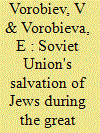

|
|
|
|
|
| Summary/Abstract |
This year will see the 70th anniversary of the Great Victory, one more illustrious jubilee date commemorating the end of the Great Patriotic War. But this year, along with voices from progressive forces that make objective assessments of events and results of the Second World War, stressing their significance and prominence, in some countries obnoxious (there is no other word) officials are coming forward and so-called historians are waking up who are painting upside-down pictures of all that has to do with that global tragedy.
|
|
|
|
|
|
|
|
|
|
|
|
|
|
|
|
| 13 |
ID:
138490


|
|
|
|
|
| Summary/Abstract |
Armen Oganesyan, Editor-in-Chief of International Affairs: In 2014, we paid tribute to the memory of victims of World War I, which was especially sorrowful because of what happened in Russia after the war. The heroism of those who had fought in the war was remembered in many countries and cities, Russia which had been directly involved in it being no exception. One of the events which contributed to the correct understanding of the history of World War I took place at the Ministry of Foreign Affairs of Russia. I mean the presentation of the collection of documents of World War I published by the ministry's Department of History and Records.
|
|
|
|
|
|
|
|
|
|
|
|
|
|
|
|
| 14 |
ID:
138484


|
|
|
|
|
| Summary/Abstract |
Many people still wonder why Angela Merkel performed her "U-turn over the Atlantic" toward Washington. Indeed, there should be reasons which forced her to abandon the eastern political vector in favor of a center of power which, while retaining appearances, is losing real instruments of global governance.This looks even stranger in view of what Simon Serfaty, an expert in the relationships between the U.S. and Europe and former director of the CSIS Europe Program, has said: "Never has America sounded less European." Those who explained the U-turn by bugging Merkel's private phone seem naive: on the scales of history this carries no weight. "Nothing is secret, that shall not be made manifest," to quote the Bible.
|
|
|
|
|
|
|
|
|
|
|
|
|
|
|
|
| 15 |
ID:
138479


|
|
|
|
|
| Summary/Abstract |
Our professional holiday has once again clearly demonstrated the Russian leadership's unwavering focus on the diplomatic service. In his message to the current and former employees of the Ministry of Foreign Affairs posted on the website of the President of the Russian Federation, Vladimir Putin stressed the Foreign Ministry's significant contribution to upholding our national interests and strengthening the position of our country in the world arena. We also received congratulatory messages from Prime Minister Dmitry Medvedev, Chairperson of the Federation Council of the Federal Assembly Valentina Matviyenko, Chairman of the State Duma Sergey Naryshkin, committee chairmen, senators, deputies, heads of ministries, departments, and governors of the Russian regions. They all had kind words to say about the Foreign Ministry and wish us well.
|
|
|
|
|
|
|
|
|
|
|
|
|
|
|
|
| 16 |
ID:
138491


|
|
|
|
|
| Summary/Abstract |
E. Pyadysheva: Seventy years ago, from February 4 through 11, 1945, the Yalta (Crimea) Conference of the Allied Powers took place. The leaders of the anti-Hitler coalition countries - the USSR, the U.S. and the UK - Stalin, Roosevelt and Churchill met for the second time during World War II.
|
|
|
|
|
|
|
|
|
|
|
|
|
|
|
|
|
|
|
|
|